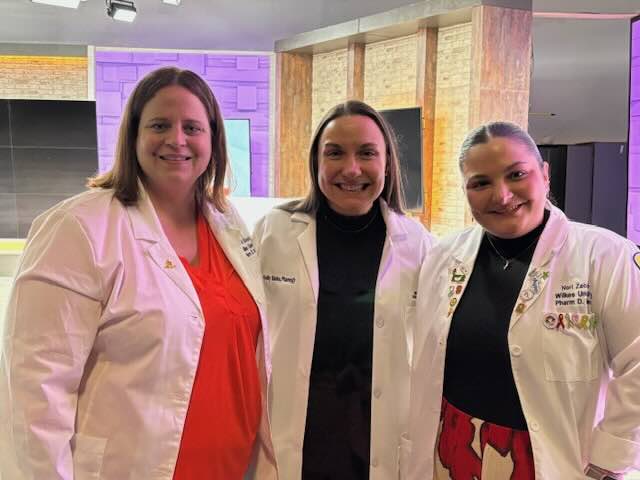Students from the Nesbitt School of Pharmacy at Wilkes University are serving the community through the Script Your Future Medication Adherence Team Challenge. Their goal: To raise awareness about the importance of taking medications according to directions.
Kelly Sklanka, assistant professor of pharmacy practice, offered several reasons behind a lack of medication adherence. High drug costs and complicated regimens may cause individuals to skip doses. Some may fear potential side effects or believe that natural remedies will work just as well. Prescription medications may carry a negative perception for younger patients. In other cases, lower levels of health literacy may cause challenges, particularly with underserved populations.
These factors can lead to a variety of complications. When health care providers don’t see the desired results, they may increase the dosage, leading to unexpected issues. For patients, starting and stopping medications can do more harm than good. Ultimately, non-adherence contributes to increases in hospitalizations, health care costs and deaths.
The student team, along with advisors Sklanka and Danielle Kieck, associate professor of pharmacy practice, have spent the last three months helping to spread the word and help patients stay on track with their medication regimens. “We love having the opportunity to talk to patients,” said Sklanka. “We can really get to the root of what’s leading to non-adherence.”
Student pharmacists have held sessions at active senior centers and conducted blood pressure screenings at the YMCA, where they also shared tips on medication adherence. While filming a segment on PA LIVE, the team connected with Amy George Feldman of Northeast Sight Services and set up a visit to assist the organization’s visually impaired clients.
Tips for staying on track with a medication regimen include using a pill box or other organizer, setting an alarm on a smartphone, associating medication with another daily activity or safely keeping medications in plain sight on the nightstand, kitchen table or next to the coffee maker. Patients can also visit a local independent pharmacy for blister packs with pills separated by day or invest in an electronic pill dispenser — a huge help for caretakers who can preload the device.
Though the Script Your Future Medication Adherence Team Challenge wraps up on March 31, that doesn’t mean patients are on their own. “We always encourage people to talk to their local community pharmacists,” she said. Pharmacists can combat many medication adherence problems. Through a conversation with a health care provider, a pharmacist may be able to offer an extended-release medication, reducing the overall number of doses needed. They may be able to reduce the overall number of medications if a maintenance drug is no longer necessary. Pharmacists can even help with affordability issues by switching to a cheaper alternative or educating people about assistance programs through drug companies or the government.
“There are a lot of things we can offer,” said Sklanka. “This is work that your pharmacist does year-round.”
Visit @wilkespharm on Facebook or Instagram to learn more.
